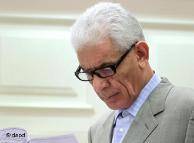NATO takes control of Libya operations as foreign minister defects
Großansicht des Bildes mit der Bildunterschrift: Koussa is to resign his post as foreign minister The British Foreign Office has said that Libyan Foreign Minister Moussa Koussa has defected and sought refuge in the UK. The news came as Moammar Gadhafi's troops pushed back rebel fighters. Libyan Foreign Minister Moussa Koussa has defected and sought refuge in London, according to the British Foreign Office. "We can confirm that Moussa Koussa arrived on March 30 at Farnborough Airport [near London] from Tunisia. He has told us he is resigning his post," a Foreign Office spokesman said in a statement, stressing that Koussa had come to Britain under his own free will. "Koussa is one of the most senior figures in Gadhafi's government and his role was to represent the regime internationally - something that he is no longer willing to do," the statement read. A senior US official, who was not named, said the defection was "very significant" and showed that Gadhafi's aides could see "the writing on the wall." Koussa, previously Gadhafi's de facto spy chief as head of Libya's External Security Organization, played a central role in negotiating the lifting of international sanctions on Libya in 2004. As a confidence-building measure, he provided information to Washington on the activities of al Qaeda in Libya and North Africa. Rebels fall back Meanwhile, Gadhafi's forces continued their relentless attacks on rebel fighters in Libya. They bombarded rebels with rockets and artillery on Wednesday, causing them to retreat east and cede oil towns. Rebels said Gadhafi's forces, which have overrun Es Sider, Uqalya and Ras Lanuf and Brega. Bildunterschrift: Großansicht des Bildes mit der Bildunterschrift: Rebels lost ground to Gadhafi's forces The rebels are calling for more coalition airstrikes against Gadhafi's forces. "We want two things: that the planes drop bombs on Gadhafi's tanks and heavy artillery, and that they (the coalition forces) give us weapons so we can fight," rebel fighter Yunes Abdelghaim told the AFP news agency. Arms backing hotly debated in UK, US But global leaders are torn on whether to back rebels with arms. On Wednesday, British Prime Minister David Cameron did not rule out the possibility of arming rebel fighters, echoing his French counterpart Alain Juppe, who had said at the London conference the previous day that he was prepared to hold discussions on the issue. But senior politicians in the UK slammed the idea, warning of the political consequences of such a move. Veteran Labour parliamentarian Denis Skinner urged Cameron not to repeat the "errors" of Afghanistan, by arming rebel groups which were later found to have been infiltrated by al Qaeda and other terrorist organizations. Bildunterschrift: Großansicht des Bildes mit der Bildunterschrift: Cameron and Clinton face opposition at home on proposals to arm rebels Across the Atlantic in Washington, lawmakers concurred with those concerns. The chairman of the intelligence committee of the House of Representatives, the lower house of the US Congress, Republican Mike Rogers, said he opposed supplying arms to the Libyan rebels "at this time." "We need to understand more about the opposition before I would support passing out guns and advanced weapons to them [the rebels]," Rogers said in a statement. US Secretary of State Hillary Clinton said on Wednesday that no decision had been taken on the issue. However, according to a report in the New York Times, the United States and Britain have inserted covert intelligence agents into Libya to make contact with rebels and to gather data to guide coalition air strikes. Author: Nicole Goebel (Reuters, AFP, AP) Editor: Rob Turner
منبع خبر: صدای آلمان ![]()
اخبار مرتبط: NATO takes control of Libya operations as foreign minister defects
حق کپی © ۲۰۰۱-۲۰۲۴ - Sarkhat.com - درباره سرخط - آرشیو اخبار - جدول لیگ برتر ایران

